Robin Hoods Bay |
|
 |
|||
A quiet North Yorkshire fishing village known for its history of smuggling |
||
Listen to this article |
||
It is unclear how this town's name came about. Some songs and stories tell of a time when the outlaw from Sherwood Forest spent time at sea, battling pirates, and returning their loot to the poor people on the land. The site of his heroic return was named Robin Hood's Bay, in his honour. However, it's not certain that Robin ever came here - in fact, it's not certain that he even existed at all! |
||
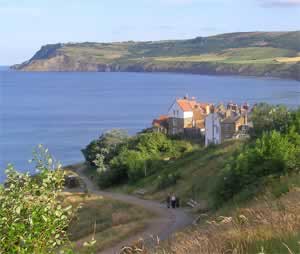 The view over Robin Hoods Bay Photo pjo18 |
||
What is known, is that this friendly, quiet town used to be known for its fishing. Every day, its residents would get up very early, head out to sea, and come back with a large haul of fresh fish. It was a perfectly normal scene that took place in dozens and dozens of similar towns all around the English coast. |
||
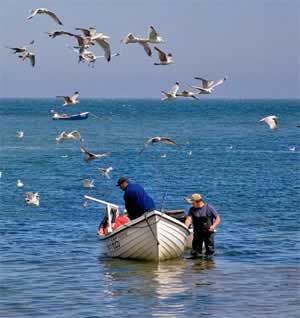 Fishing from Robin Hoods Bay Photo alh1 |
||
But this was just on the surface, because secretly, Robin Hood's Bay was a smuggler's haven. The sailors would arrive in the dead of night, and hand off their illegal cargoes to the townsfolk. The houses were said to be joined by a network of secret passages and underground tunnels that was so vast, contraband could be transported from one end of the village to another without ever going outdoors! Soon, the excise men arrived, who attempted to catch the crooks red-handed. This began a long cat-and-mouse game between the smugglers, and the law. The town's warren of tiny streets and alleys became the dramatic scene of countless chases and skirmishes. |
||
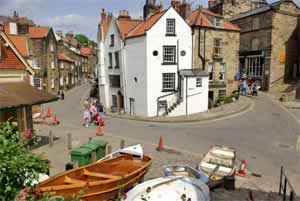 The foot of the village, where smugglers once landed their cargo Photo Stephen Mckay |
||
These cobbled, maze-like lanes are a famous feature of Robin Hood's Bay. The town clings precariously onto a cliff, resulting in some dangerously steep, twisting slopes. Exploring this labyrinth, with its stone cottages, shops and pubs, is one of the greatest pleasures that this settlement has to offer. |
||
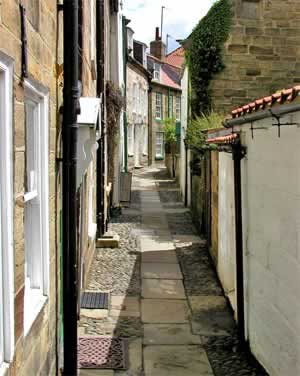 One of the narrow lanes of Robin Hoods Bay Photo Andy Beecroft |
||
If the place captures your imagination, then a visit to the Robin Hood's Bay Museum is definitely worthwhile. It shares even more of the stories from the town's past, including tragic shipwrecks, and daring rescues. There is also a model of a smuggler's home, which explains how the contraband was hidden. |
||
The museum also contains several examples of ancient fossils, which were found in the nearby area. Once upon a time, this bay was completely underwater, a fact which has left the town with a wealth of archaeological artefacts, including the remains of various bizarre, extinct sea creatures. You might even find one yourself, if you search the beach carefully enough! |
||
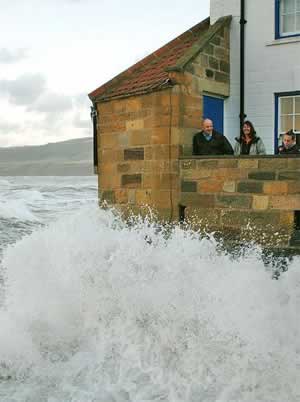 Waves crashing against the buildings of Robin Hoods Bay Photo errorist81 |
||
Robin Hood's Bay may be known for its smuggling, but during that entire time, the locals still carried on fishing - and they actually got quite good at it. Today, many of the restaurants still serve locally-caught fish, which may end up being the freshest you've ever had! |
||
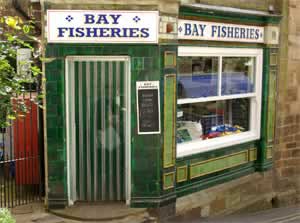 Fresh fish for sale in Robin Hoods Bay Photo Stephen McKay |
||
Although this town may initially look like a small, sleepy place, it has as many stories and tales to tell than any city you could care to name. |
||
|
||
Robin Hood’s Bay Museum is open most afternoons during school holidays except for Saturdays. Entry is FREE. Access via narrow cobbled pathways and steps. Fisherhead, Robin Hood’s Bay, Whitby, YO22 4TQ. Tel: 01723 383 636 |
||
|
Pocket Britain is optimised for use on a smartphone or tablet with internet access. All content is subject to copyright. All reasonable methods have been used to ensure information supplied is accurate at the time of publication. However, it is advisable to check information before relying on it. Privacy Policy |